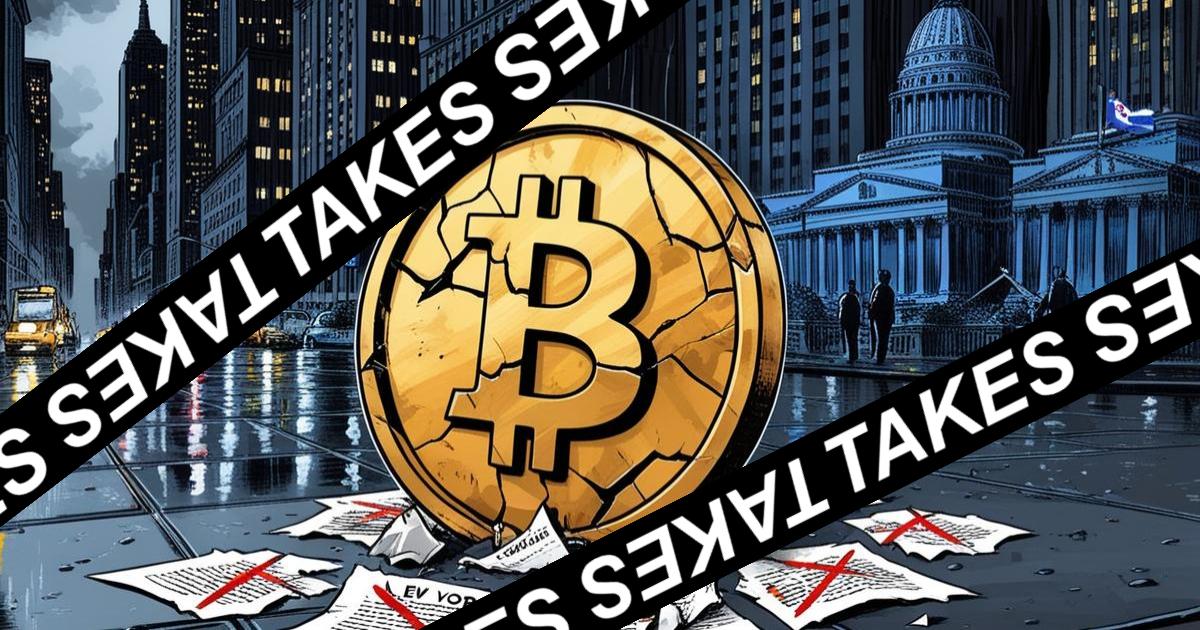Takes
The lack of soft forks is due to a lack of interest— not a lack of process
Published
4 months agoon
By
admin


As I explained in a Take two weeks ago, I think the threat (or promise, depending on your perspective) of protocol ossification is somewhat exaggerated, at least at this point in time.
Yes, the rate of soft forks has slowed down significantly over the years, the last one having been Taproot in 2021. But it seems this has more to do with a lack of interest in the potential upgrades that’ve been proposed since then, rather than it being due to the lack of a good process for deploying protocol upgrades. (Although that is not exactly a solved problem either.)
Bitcoin Core developers are generally funded on a no-strings-attached basis or outright volunteers, meaning they’re not required to work on any specific part of the codebase. As such, their time and energy will be dedicated to whatever they find most interesting or important to work on. So far, that hasn’t really been any of the soft fork proposals: the various covenant-style opcodes aren’t unequivocally perceived to offer the type of groundbreaking use cases that deserve prioritization, and while Drivechains sound great in theory, their major downside is still that miners can ultimately steal coins from them.
But even if Bitcoin Core developers aren’t interested, that doesn’t mean it’s impossible to upgrade Bitcoin. For better or worse, anyone with the right skillset (admittedly not a very low bar) can always deploy a soft fork through an alternative client, even as a user activated soft fork (UASF). Yet, despite some rumblings from time to time, no one has done this yet.
I suspect this is at least in part because the proponents of these soft forks aren’t convinced a UASF would actually be successful. And if a UASF wouldn’t be successful, maybe the upgrade is not worth doing in the first place…
This article is a Take. Opinions expressed are entirely the author’s and do not necessarily reflect those of BTC Inc or Bitcoin Magazine.
Source link
You may like


Toncoin Takes A Hit With 12% Correction After Failing To Break $4.34, More Pain?


Bitcoin sentiment falls to 2023 low, but ‘risk on’ environment may emerge to spark BTC price rally


Crypto Trader Says Dogecoin Is at a Critical ‘Make-or-Break’ Level, Updates Outlook on Solana and Avalanche


Bitcoin Covenants: CHECKSIGFROMSTACK (BIP 348)


Illinois State Senator’s Bill Seeks to Claw Back $163 Million Lost to Crypto Fraud


Here’s why Bitcoin, altcoins, and the stock market continued falling on Friday
Bitcoiners
We’ve Turned A Generation Of Bitcoiners Into Digital Goldbugs
Published
1 week agoon
March 26, 2025By
admin

Bitcoin is a technology. It is not some force of the universe, some natural element or mineral that was “discovered” floating out in the ether. It is a technology. Technologies are created by human beings, not discovered. They are designed. That design has intent, elements of it are made specifically in a way to facilitate that intent. The tolerances of what a technology can or cannot handle are a result of those design decisions, which are in turn a result of the intent.
New Bitcoiners are being brought into the world of Bitcoin through a lens that obscures and distorts the realities of Bitcoin as a technology and what that entails, and tries to pack it into the box of “digital gold.”
Bitcoiners are becoming goldbugs. People who thing Bitcoin is some magic thing that is decentralized “just cause,” whose future success is preordained and an absolute certainty.
This is a disastrous way for people to conceptualize Bitcoin. Bitcoin is a decentralized computer network. The conditions of a network are not a static thing. Environments change, network loads change, behavior of network users change. All of these things can have impacts on the viability and functioning of the network itself.
Gold doesn’t need patches for vulnerabilities. Gold doesn’t have to overhaul major subsystems because a change in user behavior overloaded them to the point of not functioning correctly or efficiently. Gold doesn’t need to worry about Denial of Service attack vectors that could disrupt, or worst case bring down, the entire “gold network.”
Bitcoin does. Bitcoin is not “digital gold,” it is a decentralized network made of software individuals actually have to run and maintain. The Bitcoin goldbugs have completely lost connection with this reality, at least when it comes to rationally assessing risks to Bitcoin, or ways it genuinely could fail or be co-opted.
Bitcoin is going to have problems it needs to solve, at a fundamental technical level. It already does, and it will have more. This is how technology works, it is an inherent part of it. Bitcoin’s value stems from its use as a censorship resistant network, a freedom money no one can stop you from using. That is its core valuable characteristic.
That characteristic hinges entirely on its decentralized nature.
If people do not work to defend that decentralized nature, to interact with Bitcoin in a decentralized fashion, to improve and fix it as needed to counteract limitations or pressures encouraging centralization, then it will not remain decentralized.
We are going to very soon regret the consequences of focusing so much outreach the last few cycles purely on spreading this “digital gold” narrative. This entire generation of Bitcoiners does not fundamentally understand that decentralization isn’t a static unchanging characteristic set in stone forever.
It needs to be maintained.
This article is a Take. Opinions expressed are entirely the author’s and do not necessarily reflect those of BTC Inc or Bitcoin Magazine.
Source link


People like to refer to Bitcoin as a trojan horse that we are going to smuggle into the legacy financial system and government. Stablecoins are a trojan horse into our system that has already been successfully smuggled in.
Stablecoins are heralded as some savior of the developing world, a positive escape hatch for them from decrepit financial systems and local currency risks. Well that’s the thing about traps, they have to entice you to wander into them or they don’t function very well as traps do they?
All of the stablecoin volume of significance happens on highly centralized blockchains, issued through highly centralized smart contracts that almost entirely (with rare exceptions like Liquid currently) have the power to arbitrarily freeze or confiscate any outstanding stablecoin tokens. A single party, the issuer, for the super majority of tokens they have issued, can freeze and seize their funds. Anywhere. Anyone. Globally.
These blockchains almost all function on an account model as well, meaning that default behavior associates every transaction a user makes with a single public address identifier, putting their entire transactional history in full view of the world with a single glance. No UTXO clustering, no fancy analysis needed, just look at the account address.
To compound things even further, because all of these chains are highly centralized, there is no software to speak of that general users interact with that is fully validating. Wallets connect to one of a few highly centralized servers every time they interact with their account and associate their IP address with that account.
This is a trap. Pure and simple. The United States does not need a CBDC, it has US Dollar stablecoins. They already function in a way that concentrates all private information that could connect individuals to their on-chain activity in a few hands. All it takes is one interaction with a KYC exchange, or an address posted online, connection to a social media account, and you’re identified.
Stablecoins are just as programmable as a CBDC. Just as capable of implementing restrictions like expiring money, or money that can only be spent in certain ways or certain places. What’s the only difference between the two that matters? Adoption. Stablecoins are viewed favorably, and highly used, whereas most places the sentiment is very against CBDCs.
All of the pieces are there. The central point of control to seize the tokens, the total lack of privacy that makes a single association of KYC data a permanent surveillance mark, and the complete concentration of where that private information will wind up. All there to be snatched up and collected by the US government whenever it wants, and used to coerce stablecoin issuers into acting how they see fit.
These stablecoins are US dollar proxies, they must interact with the legacy financial system, they have to hold actual dollars and treasuries. It is necessitated by how they work. They are under the government’s thumb, particularly the US government’s thumb, whenever the government wishes it.
It blows my mind that people not only accept the process of this happening, but some actively cheer it on. Bitcoin aims to be a truly sovereign and free money that enables anyone to do whatever they want with their own wealth. Yet we are now apparently cheering on the exact opposite of that riding Bitcoin’s coattails to adoption in parallel.
Help me make that make sense.
CBDCs are a bogeyman to keep us distracted from the very real threat of a financial surveillance system that’s already here, stablecoins. We should be confronting that, not sweeping it under the rug.
This article is a Take. Opinions expressed are entirely the author’s and do not necessarily reflect those of BTC Inc or Bitcoin Magazine.
Source link
bitlicense
Democrats Propose More Bad Bitcoin And Crypto Regulation
Published
1 week agoon
March 25, 2025By
admin
On Friday, Maryland Delegate Adrian Boafo (D) and New York Assemblyman Clyde Vanel (D) sent a joint letter to Democratic Congressional leaders urging them to pass comprehensive crypto legislation at the federal level.
In the letter, the elected officials cited New York State as being a leader in crypto regulation and proposed that New York’s BitLicense be used as a model for what federal crypto regulation should look like. The letter’s authors also noted that New York State has placed a two-year moratorium on proof-of-work cryptocurrency mining that uses fossil fuels (seemingly citing this as something else the federal government might consider doing).
It was upon reading these points in the letter that I realized that Democrats are capable of putting forward Bitcoin and crypto policy ideas stupider than what former Vice President Harris proposed in October 2024, which was “a regulatory framework for cryptocurrency and other digital assets [that protects] Black men who invest in and own these assets.”
(Please note that I’m in favor of a regulatory framework that protects the right of Black men to invest in crypto assets. I’m also in favor of one that protects the right of Asian men, Hispanic men, White men, and Indigenous men to do the same. Oh, and I’d like for whatever Bitcoin and crypto policy we craft here in the U.S. to protect the right of women and transgender people of all races to invest in bitcoin and crypto, as well.)
With that said, let me break down why the U.S. federal government’s creating something comparable to New York’s BitLicense and putting a mining moratorium on Bitcoin miners that use any amount of fossil fuels would be a bad idea.
And please forgive me in advance for being emotional at points. This issue is personal to me, as I’m a resident of New York State and have experienced firsthand the damage that politicians and bureaucrats have done to the Bitcoin and crypto industry in the state.
The BitLicense
New York State requires that all virtual currency businesses that operate in the state obtain a BitLicense.
At face value, obtaining a license to operate a business seems harmless enough. But once you learn that it takes months to years to complete all of the paperwork and to jump through all of the hoops required to obtain one and that it costs upward of $100,000 to go through this process, you quickly see why so many established companies in the space — never mind the early-stage start-ups — don’t even start the process.
Because of the BitLicense, New York State residents cannot use reputable platforms like Strike, River, Swan, and Kraken. Nor can they use Lightning on CashApp or the fiat-to-bitcoin exchange on Fold. This is only to name a few of the Bitcoin/crypto products and services that we can’t use because of red tape.
But what’s perhaps more of a slap in the face is that when you attempt to use some of these platforms as a New York State resident, you’re presented with messages such as “This exchange doesn’t serve residents of jurisdictions including New York State, Iran, Syria and North Korea.”
TRULY FUCKING STAGGERING THE COMPANY THAT NEW YORK POLITICIANS AND BUREAUCRATS HAVE PUT NEW YORK RESIDENTS IN.
If we were to apply the BitLicense on a federal level, we would deeply stifle innovation and entrepreneurship, as not only would we greatly hinder the Bitcoin and crypto companies that have the money and resources to go through the process of obtaining a federal BitLicense, but we’d create a moat around them while creating a scenario in which the start-ups that can’t afford to go through the process either close up shop or simply not serve U.S. citizens.
A federal BitLicense would be a major hindrance to President Trump’s accomplishing his goal of making the United States the Bitcoin superpower and the crypto capital of the world. (Maybe that’s why these Democrats proposed it?)
The Mining Moratorium
While I know that burning fossil fuels is detrimental to the environment and I believe that human-made climate change is a real thing, I’m also a proponent of people being gainfully employed and industries being able to flourish.
And in upstate New York, there’s been a notable lack of both since factories began closing down in the region after World War II.
What’s replaced gainful employment in factories in many parts of upstate New York are service-sector jobs that barely enable workers to make ends meet.
The urban blight in most cities in upstate New York is so palpable that it’s nauseating.
What we could do to revive upstate New York is invite the Bitcoin mining industry in. Sure, Bitcoin mining companies might burn some fossil fuels to power their operations at first, but as Bitcoin mining incentivizes renewable energy production, they could move away from fossil fuels as their source of energy.
Also, if the likes of Assemblyman Vanel and New York State’s governor, Kathy Hochul (D), are so against companies that burn fossil fuels then 1) Why haven’t they put a moratorium on all companies in the state that use fossil fuels? and 2) Why haven’t they enacted laws that do things like stopping all New York residents from using cars that have internal combustion engines?
I ask these questions rhetorically, as I know I’d never get answers from either of them on this, because the mining moratorium is more for show — virtue signaling, if you will — than anything.
If they really wanted to make a concerted effort to stop the environmental damage that burning fossil fuels causes in New York, they’d do much more than prohibit Bitcoin mining companies that use fossil fuels from operating in the state (and they’d take down the economy of New York in the process).
If we were to apply such a mining moratorium on a federal level, we’d not only put many Americans out of work, but we’d also cede much of the hashrate to hostile foreign powers who are using fossil fuels to mine bitcoin anyway.
My Plea To Democrats
Please stop proposing regulation that will hurt an industry that could otherwise provide many Americans with high-quality jobs.
Please stop listening to the likes of Delegate Boafo, Assemblyman Vanel, or any of the backward-thinking Democrats to which this letter was addressed, including Rep. Maxine Waters (D-CA) and Senator Elizabeth Warren (D-MA).
Instead, start taking queues from more forward-thinking Democrats like Congressman Ro Khanna (D-CA), Congressman Ritchie Torres (D-NY), and former Congressman Wiley Nickel (D-NC), politicians who would like to see Bitcoin and the industry that surrounds it succeed in the United States.
Source link

Toncoin Takes A Hit With 12% Correction After Failing To Break $4.34, More Pain?

Bitcoin sentiment falls to 2023 low, but ‘risk on’ environment may emerge to spark BTC price rally

Crypto Trader Says Dogecoin Is at a Critical ‘Make-or-Break’ Level, Updates Outlook on Solana and Avalanche

Bitcoin Covenants: CHECKSIGFROMSTACK (BIP 348)

Illinois State Senator’s Bill Seeks to Claw Back $163 Million Lost to Crypto Fraud

Here’s why Bitcoin, altcoins, and the stock market continued falling on Friday

Bitcoin Falls Back to $83K, XRP, SOL, DOGE Surrender Gains as China Announces 34% Tariffs on All U.S. Goods

BTC Holds $84K, ATOM & FIL Become Top Gainers

Analysts Eye 20% Breakout If This Level Is Reclaimed

AI and blockchain — A match made in heaven

‘We’re Still in Danger Territory’: Crypto Analyst Unveils Bearish Setup for Bitcoin – Here Are His Targets

Bitcoin Startups Raised Nearly $1.2 Billion

Illinois to End Lawsuit Against Coinbase Over Staking Program: Report

Justin Sun takes legal action against FDUSD issuer
Not a Meme! DePIN Can Take Crypto Mainstream

Arthur Hayes, Murad’s Prediction For Meme Coins, AI & DeFi Coins For 2025

Expert Sees Bitcoin Dipping To $50K While Bullish Signs Persist

Aptos Leverages Chainlink To Enhance Scalability and Data Access

Bitcoin Could Rally to $80,000 on the Eve of US Elections

Sonic Now ‘Golden Standard’ of Layer-2s After Scaling Transactions to 16,000+ per Second, Says Andre Cronje

Institutional Investors Go All In on Crypto as 57% Plan to Boost Allocations as Bull Run Heats Up, Sygnum Survey Reveals

Crypto’s Big Trump Gamble Is Risky

Ripple-SEC Case Ends, But These 3 Rivals Could Jump 500x

Has The Bitcoin Price Already Peaked?

A16z-backed Espresso announces mainnet launch of core product

Xmas Altcoin Rally Insights by BNM Agent I

Blockchain groups challenge new broker reporting rule

The Future of Bitcoin: Scaling, Institutional Adoption, and Strategic Reserves with Rich Rines

Trump’s Coin Is About As Revolutionary As OneCoin

Is $200,000 a Realistic Bitcoin Price Target for This Cycle?
Trending

 24/7 Cryptocurrency News5 months ago
24/7 Cryptocurrency News5 months agoArthur Hayes, Murad’s Prediction For Meme Coins, AI & DeFi Coins For 2025

 Bitcoin3 months ago
Bitcoin3 months agoExpert Sees Bitcoin Dipping To $50K While Bullish Signs Persist

 24/7 Cryptocurrency News3 months ago
24/7 Cryptocurrency News3 months agoAptos Leverages Chainlink To Enhance Scalability and Data Access

 Bitcoin5 months ago
Bitcoin5 months agoBitcoin Could Rally to $80,000 on the Eve of US Elections

 Altcoins2 months ago
Altcoins2 months agoSonic Now ‘Golden Standard’ of Layer-2s After Scaling Transactions to 16,000+ per Second, Says Andre Cronje

 Bitcoin5 months ago
Bitcoin5 months agoInstitutional Investors Go All In on Crypto as 57% Plan to Boost Allocations as Bull Run Heats Up, Sygnum Survey Reveals

 Opinion5 months ago
Opinion5 months agoCrypto’s Big Trump Gamble Is Risky

 Price analysis5 months ago
Price analysis5 months agoRipple-SEC Case Ends, But These 3 Rivals Could Jump 500x


